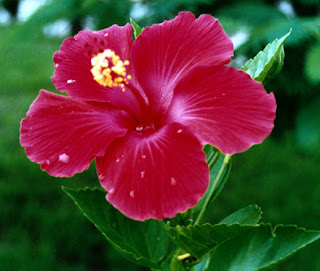Hibiscus
Hibiscus
MEDICINAL USE OF Hibiscus:-
Hibiscus ( Hibiscus rosa-sinensis , Family: Malvaceae) acts as an antiseptic, aphrodisiac, astringent, cholagogue, demulcent, digestive, diuretic, emollient, purgative, refrigerant, resolvent, sedative, stomachic and tonic. All the parts of Hibiscus plant are useful medicinally. Hibiscus leaves are emollient, diuretic, refrigerant and sedative. Leaves, seeds, and mature calyces exhibit diuretic and antiscorbutic properties. Succulent calyx, boiled in water, is used as a drink in bilious problems. Fruits act as antiscorbutic. Bitter roots are used as aperitive and tonic. Mucilaginous leaves can be used as an emollient and as a soothing cough remedy. Hibiscus leaves make excellent shampoo. Flower extract has been used in many folk remedies for liver disorders, high blood pressure and as aphrodisiac. Hibiscus relieves stomach problems, sweetens breath and soothes nerves. An extract of the hibiscus flowers lower cholesterol content in blood serum and helps to prevent oxidation of LDL (bad cholesterol). Daily uptake of Hibiscus tea is useful for reducing high blood pressure.
Hibiscus
MEDICINAL USE OF Hibiscus:-
Hibiscus ( Hibiscus rosa-sinensis , Family: Malvaceae) acts as an antiseptic, aphrodisiac, astringent, cholagogue, demulcent, digestive, diuretic, emollient, purgative, refrigerant, resolvent, sedative, stomachic and tonic. All the parts of Hibiscus plant are useful medicinally. Hibiscus leaves are emollient, diuretic, refrigerant and sedative. Leaves, seeds, and mature calyces exhibit diuretic and antiscorbutic properties. Succulent calyx, boiled in water, is used as a drink in bilious problems. Fruits act as antiscorbutic. Bitter roots are used as aperitive and tonic. Mucilaginous leaves can be used as an emollient and as a soothing cough remedy. Hibiscus leaves make excellent shampoo. Flower extract has been used in many folk remedies for liver disorders, high blood pressure and as aphrodisiac. Hibiscus relieves stomach problems, sweetens breath and soothes nerves. An extract of the hibiscus flowers lower cholesterol content in blood serum and helps to prevent oxidation of LDL (bad cholesterol). Daily uptake of Hibiscus tea is useful for reducing high blood pressure.
(Hibiscus rosa-sinensis) Hibiscus is one of the most common garden shrubs used for hedges. It grows in any soil with little care. The flower is solitary, half opened in the morning, but as the weather warms up, it opens fully. The foliage of this shrub is deep green in color or variegated.
Parts Used: The whole plant
Medicinal Use
- Coughs and colds
- Gentle laxative and a softener of inflamed parts
- Soothes internal and external wounds and sores, it also soothes the alimentary tract and relieves inflammation
- Lowers body heat
How to Use
- The decoction of hibiscus roots is used for coughs and colds.
- The leaves make a gentle laxative and soften inflamed parts.
- The application of the crush flowers soothes external wounds and sores. The infusion of the petals of the flower soothes and protects the alimentary tract, relieves inflammation and lowers body heat.
- In fevers, an infusion of the flowers help to reduce body temperature


No comments:
Post a Comment